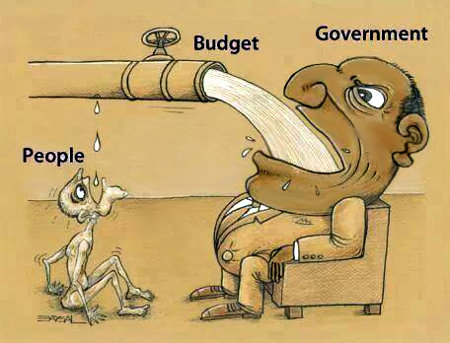 Nothing says, “Fuck the Constitution,” quite the demand for censorship and the banning of certain words and/or phrases in an effort to enact some agenda-driven social engineering experiment. Hence, it’s not in least surprising that a Liberal, Elizabeth Bruenig, wants to do exact that. Specifically she wants to ban the use of the word taxpayer(s)” from political discourse and punditry because she feels it’s too divisive.
Nothing says, “Fuck the Constitution,” quite the demand for censorship and the banning of certain words and/or phrases in an effort to enact some agenda-driven social engineering experiment. Hence, it’s not in least surprising that a Liberal, Elizabeth Bruenig, wants to do exact that. Specifically she wants to ban the use of the word taxpayer(s)” from political discourse and punditry because she feels it’s too divisive.
After lambasting and deriding the Congressional Republicans’ budget for the 2016 fiscal year – for all the reasons one would expect a Leftist to do so – the bint went on to say:
But the plan is also an ideological document meant to advance a particular set of beliefs about how government should function, and toward what end. Its composition and slick rollout (including an upbeat YouTube presentation, a BuzzFeed-esque gif set, and a highly navigable website complete with rolling documentation of news coverage) are meant not only to advance certain policy measures, but persuade voters to adopt its ideological point of view.
Which is why its use of the term “taxpayerâ€â€”though hardly atypical of political documents—is notable. In the 43-page budget, the word “taxpayer†and its permutations appear 24 times, as often as the word “people.†It’s worthwhile to compare these usages, because the terms are, in a sense, rival ideas. While “people†designates the broadest possible public as the subject of a political project, “taxpayer†advances a considerably narrower vision—and that’s why we should eliminate it from political rhetoric and punditry.
Though addressing people as “taxpayers†is common enough to appear politically neutral, it tends to carry more argumentative weight than it’s typically credited with. The House budget is full of examples of seemingly straightforward deployments of the term which are, upon closer inspection, clearly furthering a particular ideology. “There are too many scenarios these days in which Washington forgets that its power is derived from the ‘consent of the governed,’†the plan reads in one instance of the term’s use. “It forgets that its financial resources come from hard-working American taxpayers who wake up every day, go to work, actively grow our economy and create real opportunity.†In other words, Americans’ taxes are parallel with taxpayers’ consent, suggesting that expenditures that do not correspond to an individual’s will are some kind of affront. The report goes on to argue that
food stamps, public housing assistance, and development grants are judged not on whether they achieve improved health and economic outcomes for the recipients or build a stronger community, but on the size of their budgets. It is time these programs focus on core functions and responsibilities, not just on financial resources. In so doing this budget respects hard-working taxpayers who want to ensure their tax dollars are spent wisely.
Put simply, taxpayers should get what they pay for when it comes to welfare programs, and not be overcharged. But, as the Republican authors of this budget know well, the beneficiaries of welfare programs tend to receive more in benefits than they pay in taxes, because they are in most cases low-income. The “taxpayers†this passage has in mind, therefore, don’t seem to be the recipients of these welfare programs, but rather those who imagine that they personally fund them. By this logic, the public is divided neatly into makers and takers, to borrow the parlance of last election’s Republicans.
Yes, that’s right. Bruenig doesn’t want “Taxpayer” to be used because it inherently differentiates the 53% of the American population with “skin in the game” from the 47% who do not contribute to- but take full advantage of the largess of the federal government. She also has a big issue with the idea that those taxes are monies taken from private individuals and corporations since she doesn’t believe that those people ever owned that money in the first place. Of course, her being a “Christian” Socialist and not believing in private property in the first place, her anti-American attitude is to be fully expected.
Property, rightly construed, can have a salutary social function. But this is only when ownership is premised upon the prior meeting of everyone’s needs. It is also only feasible when property itself, as an institution, is viewed as a means to justice and a tool for serving humankind.
— Elizabeth S. Bruenig
So, as can easily be seen, this cancer of democracy, is one of the ever-present motivating forces, however weak, that seek to advance America through the fatal sequence of the Tytler Cycle. And, if censorship is needed to do that, she’s the sort who will be perfectly OK with that. After all, I doubt that she believes that Americans own their voices either.
To put the worth of her opinion in perspective, however, one must realize that Bruenig also believes that the problem with modern sex, especially non-normative, outre, or just plain perverted sex, is that it’s not political, and that the biggest flaw of the oft and rightfully lambasted book and movies, 50 Shades of Grey is that it’s pro-capitalism.
Like this:
Like Loading...
Tags: America | Bruenig | Budget | Congress | Eaters | Entitlement Society | GOP | Language & Idiom | Leftists | Liberals | Makers | Progressives | Property | Republicans | Takers | Taxes | Taxpayers
This entry was posted on Thursday, March 26th, 2015 at 9:49 am and is filed under Politics.
You can skip to the end and leave a response. Pinging is currently not allowed.

 Nothing says, “Fuck the Constitution,” quite the demand for censorship and the banning of certain words and/or phrases in an effort to enact some agenda-driven social engineering experiment. Hence, it’s not in least surprising that a Liberal, Elizabeth Bruenig, wants to do exact that. Specifically she wants to
Nothing says, “Fuck the Constitution,” quite the demand for censorship and the banning of certain words and/or phrases in an effort to enact some agenda-driven social engineering experiment. Hence, it’s not in least surprising that a Liberal, Elizabeth Bruenig, wants to do exact that. Specifically she wants to  There is, quite rightfully, a lot of kerfuffle over the Obama Regime’s new military budget which cuts the military to
There is, quite rightfully, a lot of kerfuffle over the Obama Regime’s new military budget which cuts the military to  How The Budget Is Spent
How The Budget Is Spent
